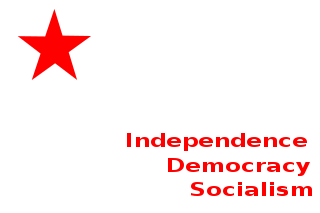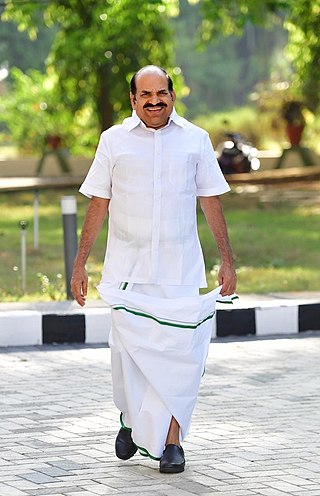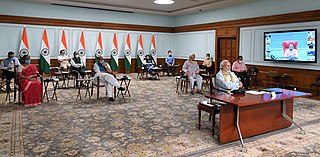| |||||
| Centuries: | |||||
|---|---|---|---|---|---|
| Decades: | |||||
| See also: | List of years in Kerala History of Kerala | ||||
Events in the year 2020 in Kerala.
| |||||
| Centuries: | |||||
|---|---|---|---|---|---|
| Decades: | |||||
| See also: | List of years in Kerala History of Kerala | ||||
Events in the year 2020 in Kerala.
 | The Governor of Kerala | Arif Mohammad Khan |
 | Chief minister of Kerala | Pinarayi Vijayan |
 | Chief Justice of Kerala High Court | S. Manikumar |

The Students' Federation of India (SFI) is an Indian left-wing student organisation that is politically aligned to the ideologies of Independence, democracy and socialism. Currently, V. P. Sanu and Mayukh Biswas are elected as the All India President and General Secretary, respectively.

Ernakulam is the central business district of the city of Kochi, Kerala, India. It is the namesake of Ernakulam district. The eastern part of Kochi city is mainly known as Ernakulam, while the western part of it after the Venduruthy Bridge is called as Western Kochi. Many major establishments, including the Kerala High Court, the office of the Kochi Municipal Corporation and the Cochin Shipyard are situated in Ernakulam. It is also the most urbanized area in the city of Kochi. The Southern Naval Command (SNC) is in Kochi, Ernakulam district, Kerala. Established in 1958, it is the largest naval command of the Indian Navy, focusing on training and maritime security operations in the Arabian Sea and Indian Ocean.

Maradu is a municipality and census town in the Ernakulam district of Kerala, India. Maradu is an inner suburb of the Kochi metropolitan area and is located 6 km (3.7 mi) south of the Kochi city centre. As per the 2011 Indian census, Maradu has a population of 44,704 people.

Kodiyeri Balakrishnan was an Indian politician of the Communist Party of India (Marxist). He was the secretary of the CPI(M) Kerala State Committee from 2015 to 2022. He stepped down from the position of state secretary due to his failing health. He was the Chief Editor of the Malayalam newspaper Deshabhimani.

Nucleus Mall is a mall in Kochi, Kerala and is located in the developing suburban of Maradu, near to Thripunithura and around 8 km (5.0 mi) from the city centre. The mall is constructed and managed by ABAD Builders, a prominent builder of villas and apartments based in Kochi.

On 8 May 2019, the Supreme Court of India ordered five apartments in Maradu municipality in Kerala to be demolished within one month, for violation of Coastal Regulation Zone (CRZ) rules, although only four of these apartments had yet been constructed. These four, already occupied by tenants, were Jains Coral Cove, H2O Holy Faith and Alfa Serene and Golden Kayaloram. The fifth builder, Holiday Heritage, had scrapped the project.
The COVID-19 pandemic in India is a part of the worldwide pandemic of coronavirus disease 2019 caused by severe acute respiratory syndrome coronavirus 2. As of 3 November 2024, according to Indian government figures, India has the second-highest number of confirmed cases in the world with 45,044,081 reported cases of COVID-19 infection and the third-highest number of COVID-19 deaths at 533,652 deaths. In October 2021, the World Health Organization estimated 4.7 million excess deaths, both directly and indirectly related to COVID-19 to have taken place in India.
The first case of the COVID-19 pandemic in Kerala was confirmed in Thrissur on 30 January 2020. As of 5 April 2022, there have been 65,34,352 confirmed cases, test positivity rate is at 2.04%, with 64,62,811 (98.91%) recoveries and 68,197 (1.04%) deaths in the state.
The first case of the COVID-19 pandemic in the Indian state of Karnataka was confirmed on 8 March 2020. Two days later, the state became the first in India to invoke the provisions of the Epidemic Diseases Act, 1897, which was set to last for a year, to curb the spread of the disease. As of 25 October 2022, Karnataka has 40,01,655 confirmed cases and 40,097 deaths. with 39,52,381 recoveries and 9,135 active cases.

The Indian state governments have responded to the COVID-19 pandemic in India with various declarations of emergency, closure of institutions and public meeting places, and other restrictions intended to contain the spread of the virus.
The first case of the COVID-19 pandemic in the Indian state of Tamil Nadu was reported on 7 March 2020.

Indian migrant workers during the COVID-19 pandemic have faced multiple hardships. With factories and workplaces shut down due to the lockdown imposed in the country, millions of migrant workers had to deal with the loss of income, food shortages and uncertainty about their future. Following this, many of them and their families went hungry. Thousands of them then began walking back home, with no means of transport due to the lockdown. A study found that 43.3 million interstate migrants returned to their home during the first wave of Covid-19 led lockdowns and out of 43.3 million around 35 million walked home or used unusual means of transportation. In response, the Central and State Governments took various measures to help them, and later arranged transport for them. 198 migrant workers died due to the lockdown, with reasons of road accidents.
Abhimanyu was a student activist stabbed to death in Maharaja's College, Ernakulam on 2 July 2018. He was a student of B.Sc. Chemistry.

The first responses of the government of India to the COVID-19 pandemic in the country involved thermal screenings of passengers arriving from China, the country from which the coronavirus disease 2019 originated, as well as of passengers arriving from other countries. As the pandemic spread worldwide, the Indian government recommended social distancing measures and also initiated travel and entry restrictions. Throughout March 2020, several shutdowns and business closures were initiated, and by the end of the month, the Indian government ordered a widespread lockdown. An economic package was announced in May 2020.
On 10 August 2020, members of the Narcotics Control Bureau (NCB) made simultaneous drug raids in Mumbai and Bengaluru relating to an alleged international MDMA (ecstasy) drugs racket. Based on evidence collected during the raids, the NCB made arrests of three other individuals on 21 August. Police said they had seized ₹2.2 lakh cash and 145 MDMA pills. According to police, one of the accused had a diary allegedly containing the names of 15 celebrities: including reality television personalities, musicians, actors in Kannada cinema and models, who the accused claimed were regular customers. The police claimed these accused were selling their products to affluent sections of Bangalore society. Other searches were made at properties allegedly belonging to major Kannada film stars. In light of the busts, Kannada filmmaker Indrajit Lankesh alleged 15 members of the Sandalwood were involved in the drugs racket, and accordingly gave a statement to the police. As on 8 September 2020, six people were arrested in connection with the case, including two Kannada film actors: Ragini Dwivedi and Sanjjanaa Galrani, and Viren Khanna, a celebrity party organizer, at whose house a police uniform was allegedly found. Other children of politicians and other VIPs are also sought by the police in connection with the case, including Aditya Alva, the son of former minister Jeevaraj Alva and brother-in-law of actor Vivek Oberoi, who allegedly rented out his property for parties at which drugs were consumed. An FIR was registered against 12 people allegedly involved in the scandal, including Jayaprakash, a film producer, Dwivedi, Galrani, and Alva. They were suspected of buying drugs from Loum Pepper Samba, an alleged drug peddler from Senegal. The bail pleas of Dwivedi and Galraniwere rejected on 3 November. Bineesh Kodiyeri, son of a Kerala minister, had his house raided on 5 November as part of a money-laundering investigation relating to drug sales in Bangalore.
Elections to local bodies in Kerala were held in December 2020. Polling took place over 3 days; on 8, 10 and 14 December, with the votes counted and results announced on 16 December.

Palarivattom Flyover is considered to be one of the most notorious scams in the history of Kerala Public Works Department. The scam exposed the alleged nexus between politicians, bureaucracy and contractors.
Events in the year 2021 in India for real time basis.
The following is the timeline of the COVID-19 pandemic in Kerala from 30 January to 1 December 2020. The timeline is accompanied by a list of confirmed COVID-19 deaths in Kerala until 6 August 2020

Events in the year 2021 in Kerala.